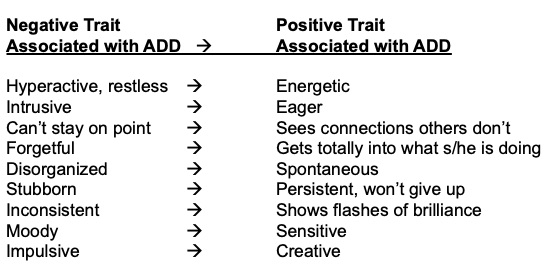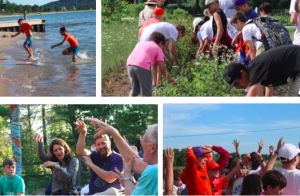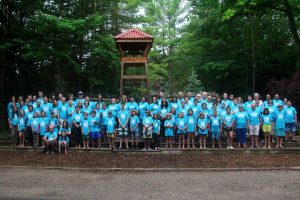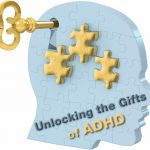Most people who don’t have Attention Deficit Hyperactivity Disorder (ADHD) don’t understand it. They often associate ADHD with what is wrong with a person. And when you receive a diagnosis of ADHD, you may feel shame, fear and self-doubt. So changing your perspective on ADHD is the first step in removing the stigma surrounding ADHD.
You see, I have ADHD and my daughter and one of my sons have ADHD. I believe in emphasizing the positive traits of ADHD. I think that people with ADHD represent some of the most fascinating, fun, and fulfilling of all the people I meet. However, words such as structure, supervision, reminders, and persistence don’t even begin to describe the magnitude of the task people with ADHD have to tackle every day, especially kids.
Children need their parents to understand their difficulties, and teach them to overcome those challenges. As parents, the best way to help your child is to start by changing your own thinking about ADHD. When explaining ADHD to a child, I say, “you have a turbo charged mind – like a Ferrari engine, but the brakes of a bicycle, and I’m the brake expert.” When ADHD is properly treated, children can achieve great heights: doctors, lawyers, CEO’s, dreamers, innovators, explorers and even Harvard grads. Founders of our country may have had ADHD. The flip-side of distractibility is curiosity.
Barriers Parents Face: Steps to Changing Your Perspective on ADHD
1. Educate yourself
By far, the biggest barriers for parents are denial, ignorance, and a refusal to learn. Dads and moms can dig in and simply refuse to listen to facts or reason. If this goes on too long, children can suffer severe damage, and families can be destroyed. The stakes are high, not only for the child, but the whole family. So you need to learn what ADHD is and what it isn’t. Perhaps the single most powerful treatment for ADHD is understanding ADHD in the first place. You need to understand what a positive attribute ADHD can be in your child’s life. So read books. Talk with professionals. Talk with other parents whose children have ADHD. You need to understand ADHD well enough to embrace it so you can help your child avoid unnecessary suffering, as that breaks kids rather than builds them up. It takes time, and effort, but it’s worth it.
2. Look for that special spark
In my daily practice, I see and treat kids with ADHD. Just being with them usually makes me smile. They invariably have a special something, a spark, a delightful quirk – which they sometimes try to hide, but which I usually can find. Then they relax, brighten up, and make me laugh and learn.
Look for that special something and help your child feel good about who s/he is. Identify his/her talents, strengths, interests and dreams. Teach him/her to see and believe in what s/he can do, and avoid the tendency to focus on what s/he can’t do. When you believe in your child, it makes it easier for him/her to believe, too.
3. Unconditional Love:
Let your love for your child carry the day. Tune out the diagnosticians and labelers and simply notice and nourish the spirit of your child for who s/he is. Providing this unshakable base of support will set the tone for all interactions to come. This is what builds self-esteem, confidence, and motivation, which in turn create joy and success in life.
Several studies suggest that loving acceptance by parents is the most important thing teens with ADD need in dealing with symptoms. Make sure that your child knows, every day, how much you love her. Showing your love and affection will buoy your child’s sense of hope and help the family weather criticism from outside sources.
This is what these kids need more than anything else: love that never gives up.
4. Reframe Challenges in terms of Mirror Traits: Remind yourself and your child of the positive sides of the negative symptoms associated with ADD. By recognizing the mirror traits, you avoid the ravages of shame and fear.

5. Surround yourself with Laughter:
Laughter is the best medicine. Surround yourself with people who can laugh. It is important to be able to regain a perspective that allows you to see the humor in all of the messes and fixes these kids can get into. Why wait to look back on something and laugh at it – go ahead and enjoy the ridiculousness of the situation in the moment.
When our kids begin to laugh at themselves, and not take themselves quite so seriously, it allows them to learn humility without shame, and adds to their moral character and their enjoyment of life.
Conclusion:
As a parent, how you approach your child’s ADHD will set the tone for how your child manages their ADHD. When you show them compassion and understanding, you teach them to love themselves and see their strengths. That will help them find the motivation they need to take control of their ADHD, one strategy at a time.
Adapted from Superparenting for ADD: An Innovative Approach to Raising Your Distracted Child, Edward M. Hallowell, M.D. and Peter S. Jensen, M.D., Ballantine, 2008.
Resources:
Check out the ADHD Workshops for adults and parents at the Hallowell Center NYC
Parenting with Impact Video Series on the Keys to Unlocking ADHD
Learn about the Zing Performance program, a non-medication treatment for ADHD
 It’s like none other. It provides families with a fascinating week of learning, connecting, adventuring, reflecting and community-building. All members of the family are invited. Camp is suitable for siblings who do not have ADHD too.
It’s like none other. It provides families with a fascinating week of learning, connecting, adventuring, reflecting and community-building. All members of the family are invited. Camp is suitable for siblings who do not have ADHD too.







